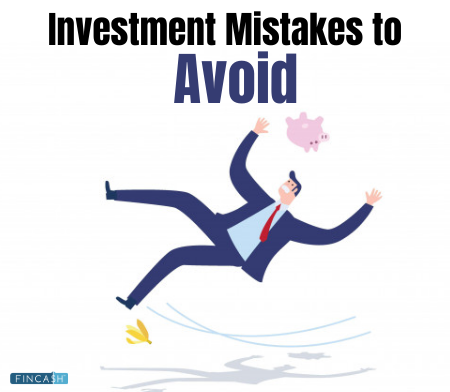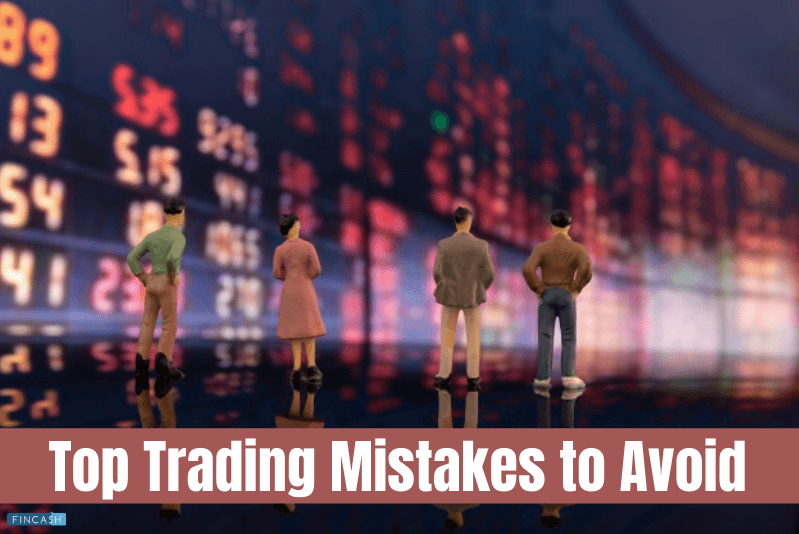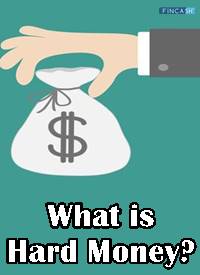Money Mistakes to Avoid in Your 50s
As long as you've been smart with your money, your 50s can be a terrific time both financially and physically. At this moment in your life, you begin to appreciate the money you've worked so hard for and are wise enough to make sensible financial decisions. It's also a crucial time that will significantly affect your life after you retire.

Mastering financial planning is the key to making the most of your money in your 50s. You'll be better qualified for retirement if you set precise financial objectives, evaluate investments, and manage your expenses.
If you're in your 50s or older, here are ten common financial blunders you should avoid.
1. Spending too Much Money
Using up all your savings before retirement is not a good idea because it can lead to a lack of funds. This is especially true in your 50s because this is the time to maximise your retirement funds and contribute to building a secure financial future.
In your 40s, you will be able to make the most money you can, and this will continue into your 50s. Pay raises are a boon at this point, but they also increase the likelihood of lifestyle Inflation, which can be a mixed blessing. Life becomes much busier, making it easier to become self-satisfied and allowing expenses to loop out of control.
2. Misguided Approach to Retirement
Since expenses and living costs change over time, a poor post-retirement plan can lead to financial difficulties. Consulting with a certified wealth manager can assist you in developing the best investment options for your Portfolio.
Medical needs, domestic needs, travel needs, and all of it are bound to change after you turn 50 and then after you retire. In such a situation, it is essential to have a perfect retirement plan to help you cover all those expenses without having to think twice before spending. If a retirement plan is not estimated and set properly, you might face severe issues as the expenses change post-retirement and due to old age.
Talk to our investment specialist
3. Lacking Knowledge of Insurance
When was the last time you reconsidered the value of your home and belongings to adjust your policy? As your cash flow grows and the cost of replacing assets rises due to inflation, you may realise that the policy you purchased a decade ago left you underinsured. Similarly, ensure that your Life Insurance can cover your expenses.
If you haven't already, now is an excellent time to review your insurance policies and see if they cover long-term care. If you don't have the right insurance, it can put a lot of stress on your finances. To help ease the financial burden of retirement, consider boosting your insurance policies with top-up plans.
4. Prioritising your Children's Education over your Retirement
Have you put money aside for your child's education? If you haven't already, using your savings to pay for your children's college or wedding expenses, for example, can be a significant drain on your post-retirement funds.Open communication about financial responsibilities with your children and establishing boundaries where necessary, will ensure that you can assist others without depleting your savings resources.
Helping your children financially through private school and university could give them a Leg up in life. Good for you if you can afford it. But don't forget about your future. If you don't save enough for retirement, it will be much more challenging to catch up and make the necessary adjustments. Thus, having enough amount to survive the retirement phase should be your number one priority.
5. Investing in a Conservative or Aggressive Way
It makes sense for someone in their 40s to have a more conservative investment portfolio. Invest your money wisely and avoid locking it up in long-term Bonds or savings accounts that are paying a Fixed Interest Rate. Ideally Mutual Funds like short-term funds, Liquid Funds, MIPs, etc., are good plan to consider. Think about how long you want to keep your money in the Market, and then pick an investment allocation that works best for you.
Conversely, pursuing high-risk investments is not advisable without consulting an expert either. Just keep things simple, spread your money around, and choose investments based on how comfortable you are with risk. This is where a financial counsellor may be of help. A limited investment portfolio will prevent you from reaping the benefits of other financial products. Making suitable investments could be a wise decision for both short- and long-term economic gains.
Short Term Goals- Up to 1 Year
Some of the best liquid & Ultra short term funds as per category rank are as follows:
Fund NAV Net Assets (Cr) 3 MO (%) 6 MO (%) 1 YR (%) 3 YR (%) 2024 (%) Debt Yield (YTM) Mod. Duration Eff. Maturity Sub Cat. Indiabulls Liquid Fund Growth ₹2,618.01
↑ 0.40 ₹165 1.5 3 6.4 6.9 6.6 6.02% 2M 2M 1D Liquid Fund JM Liquid Fund Growth ₹73.8268
↑ 0.01 ₹2,851 1.5 2.9 6.3 6.8 6.4 5.91% 1M 10D 1M 14D Liquid Fund PGIM India Insta Cash Fund Growth ₹352.415
↑ 0.05 ₹505 1.5 2.9 6.4 6.9 6.5 5.96% 1M 11D 1M 13D Liquid Fund Aditya Birla Sun Life Savings Fund Growth ₹569.942
↑ 0.31 ₹23,615 1.4 3 7.2 7.4 7.4 6.81% 5M 19D 6M 11D Ultrashort Bond Invesco India Liquid Fund Growth ₹3,720.87
↑ 0.59 ₹16,203 1.5 2.9 6.4 6.9 6.5 5.92% 1M 14D 1M 14D Liquid Fund Note: Returns up to 1 year are on absolute basis & more than 1 year are on CAGR basis. as on 15 Feb 26 Research Highlights & Commentary of 5 Funds showcased
Commentary Indiabulls Liquid Fund JM Liquid Fund PGIM India Insta Cash Fund Aditya Birla Sun Life Savings Fund Invesco India Liquid Fund Point 1 Bottom quartile AUM (₹165 Cr). Lower mid AUM (₹2,851 Cr). Bottom quartile AUM (₹505 Cr). Highest AUM (₹23,615 Cr). Upper mid AUM (₹16,203 Cr). Point 2 Established history (14+ yrs). Oldest track record among peers (28 yrs). Established history (18+ yrs). Established history (22+ yrs). Established history (19+ yrs). Point 3 Top rated. Rating: 5★ (upper mid). Rating: 5★ (lower mid). Rating: 5★ (bottom quartile). Rating: 4★ (bottom quartile). Point 4 Risk profile: Low. Risk profile: Low. Risk profile: Low. Risk profile: Moderately Low. Risk profile: Low. Point 5 1Y return: 6.40% (upper mid). 1Y return: 6.27% (bottom quartile). 1Y return: 6.36% (lower mid). 1Y return: 7.17% (top quartile). 1Y return: 6.35% (bottom quartile). Point 6 1M return: 0.53% (bottom quartile). 1M return: 0.53% (lower mid). 1M return: 0.53% (upper mid). 1M return: 0.57% (top quartile). 1M return: 0.53% (bottom quartile). Point 7 Sharpe: 3.18 (upper mid). Sharpe: 2.52 (bottom quartile). Sharpe: 3.16 (lower mid). Sharpe: 3.14 (bottom quartile). Sharpe: 3.28 (top quartile). Point 8 Information ratio: -0.71 (bottom quartile). Information ratio: -1.88 (bottom quartile). Information ratio: -0.10 (lower mid). Information ratio: 0.00 (top quartile). Information ratio: 0.00 (upper mid). Point 9 Yield to maturity (debt): 6.02% (upper mid). Yield to maturity (debt): 5.91% (bottom quartile). Yield to maturity (debt): 5.96% (lower mid). Yield to maturity (debt): 6.81% (top quartile). Yield to maturity (debt): 5.92% (bottom quartile). Point 10 Modified duration: 0.17 yrs (bottom quartile). Modified duration: 0.11 yrs (top quartile). Modified duration: 0.11 yrs (upper mid). Modified duration: 0.47 yrs (bottom quartile). Modified duration: 0.12 yrs (lower mid). Indiabulls Liquid Fund
JM Liquid Fund
PGIM India Insta Cash Fund
Aditya Birla Sun Life Savings Fund
Invesco India Liquid Fund
Mid Term Goals - For 3-5 years horizon
Following are the best Balanced Fund and Monthly Income Plan (as per category rank) that you can choose for your mid-term investments.
Fund NAV Net Assets (Cr) 3 MO (%) 6 MO (%) 1 YR (%) 3 YR (%) 2024 (%) Debt Yield (YTM) Mod. Duration Eff. Maturity Sub Cat. Edelweiss Arbitrage Fund Growth ₹20.0803
↑ 0.01 ₹16,270 1.5 3 6.2 7 6.3 6.11% 4M 6D 4M 13D Arbitrage ICICI Prudential MIP 25 Growth ₹77.8447
↓ -0.24 ₹3,359 0.2 2.4 8.2 10.2 7.9 7.6% 2Y 2M 16D 4Y 6M 22D Hybrid Debt Kotak Equity Arbitrage Fund Growth ₹38.8435
↑ 0.02 ₹72,153 1.6 3 6.3 7.2 6.4 6.33% 4M 20D 5M 5D Arbitrage Aditya Birla Sun Life Equity Hybrid 95 Fund Growth ₹1,551.47
↓ -14.08 ₹7,533 -0.7 3.1 10.9 14.6 7.2 7.42% 4Y 3M 22D 6Y 5M 5D Hybrid Equity Nippon India Arbitrage Fund Growth ₹27.4995
↑ 0.01 ₹16,393 1.6 3 6.1 6.9 6.2 0% Arbitrage Note: Returns up to 1 year are on absolute basis & more than 1 year are on CAGR basis. as on 13 Feb 26 Research Highlights & Commentary of 5 Funds showcased
Commentary Edelweiss Arbitrage Fund ICICI Prudential MIP 25 Kotak Equity Arbitrage Fund Aditya Birla Sun Life Equity Hybrid 95 Fund Nippon India Arbitrage Fund Point 1 Lower mid AUM (₹16,270 Cr). Bottom quartile AUM (₹3,359 Cr). Highest AUM (₹72,153 Cr). Bottom quartile AUM (₹7,533 Cr). Upper mid AUM (₹16,393 Cr). Point 2 Established history (11+ yrs). Established history (21+ yrs). Established history (20+ yrs). Oldest track record among peers (31 yrs). Established history (15+ yrs). Point 3 Top rated. Rating: 5★ (upper mid). Rating: 4★ (bottom quartile). Rating: 5★ (lower mid). Rating: 4★ (bottom quartile). Point 4 Risk profile: Moderately Low. Risk profile: Moderately High. Risk profile: Moderately Low. Risk profile: Moderately High. Risk profile: Moderately Low. Point 5 5Y return: 5.93% (bottom quartile). 5Y return: 8.76% (upper mid). 5Y return: 6.08% (lower mid). 5Y return: 11.18% (top quartile). 5Y return: 5.81% (bottom quartile). Point 6 3Y return: 7.02% (bottom quartile). 3Y return: 10.23% (upper mid). 3Y return: 7.18% (lower mid). 3Y return: 14.59% (top quartile). 3Y return: 6.88% (bottom quartile). Point 7 1Y return: 6.20% (bottom quartile). 1Y return: 8.23% (upper mid). 1Y return: 6.29% (lower mid). 1Y return: 10.90% (top quartile). 1Y return: 6.12% (bottom quartile). Point 8 1M return: 0.48% (lower mid). 1M return: 0.13% (bottom quartile). 1M return: 0.51% (top quartile). 1M return: -0.18% (bottom quartile). 1M return: 0.50% (upper mid). Point 9 Alpha: -0.82 (bottom quartile). Alpha: 0.00 (top quartile). Alpha: 0.00 (upper mid). Alpha: -1.63 (bottom quartile). Alpha: 0.00 (lower mid). Point 10 Sharpe: 0.73 (upper mid). Sharpe: 0.57 (lower mid). Sharpe: 0.94 (top quartile). Sharpe: 0.15 (bottom quartile). Sharpe: 0.39 (bottom quartile). Edelweiss Arbitrage Fund
ICICI Prudential MIP 25
Kotak Equity Arbitrage Fund
Aditya Birla Sun Life Equity Hybrid 95 Fund
Nippon India Arbitrage Fund
6. Lack of Emergency Funds
This is one of the most common financial mistakes people make, and it can be very costly while being closer to retirement. Remember that medical care costs increase exponentially with age, so invest in a healthy lifestyle that includes proper diet and exercise to reduce future medical bills.
In the event of a medical emergency, a family commitment, or other unforeseen expenses, having an emergency fund on hand can help you avoid Financial Stress. This is thus a must-have for most of the people out there turning to their 50s.
7. Investing the Way you Did in your Twenties
When you're 50, you might make the same mistakes you made when you were younger. There are good chances that the current investment product is not the right one for you if you took it out more than 20 years ago. In most cases, people were either too cautious at the time or too risk-averse now. In part, it's because the risk of your investment changes over time. Financial experts advise you to reduce your portfolio's risk as you near retirement.
The 120 rule is a simple method for determining how much risk you should take. This rule states that you should include a percentage of variable Income equities in your investment portfolio by subtracting your age from 120. Of course, this isn't a hard and fast rule but a rough estimate. Consider consulting with an investment expert for guidance if you prefer not to make this decision on your own.
8. Not Enough Cash on Hand
How soon can your investment be converted into actual money? This is something to think about if you plan to invest a portion of your savings in Real Estate. You might also consider it for another investment that may be unlikely to offer immediate returns.
In your 50s, even a short-term cash flow shortage can be a significant setback. That's why high-liquidity investments are essential. Putting your eggs in one basket is seldom a good idea. A diverse portfolio of stocks, bonds, and other growth assets is less risky and more likely to produce consistent and satisfactory long-term returns.
9. Not Updating Financial Documents
It's time to check your financial records. You don't want to overlook money because of a lack of paperwork. Not having a proper will or incomplete paperwork for nominees on your estate investments can jeopardise your family's financial stability. Before retirement, it's a good idea to take care of things, like updating your will and making sure your assets and legal documents provide financial stability to you and your family members.
While it might not be the most pleasant thing to think about, death is a reality everybody has to face. Thus, despite its unpleasantness, it's essential to be prepared for it financially. If you do not have a will, or if your will is out of date, it could create many problems for your family. Moreover, make sure that all of your financial documents are updated and in order. This includes investment accounts, insurance policies, and Bank accounts. If something happens to you and your family doesn't have access to these essential documents, it could create a financial nightmare for them.
Final Note
Congratulations on making it to your 50s! This is a time when you really start to reap the benefits of all your hard work. You're more financially secure and better understand what's important to you. Just make sure you avoid these common financial blunders, and you'll be in great shape for the rest of your life.
All efforts have been made to ensure the information provided here is accurate. However, no guarantees are made regarding correctness of data. Please verify with scheme information document before making any investment.












